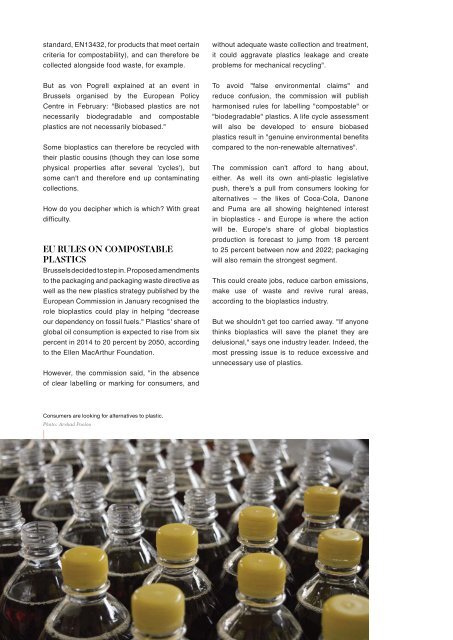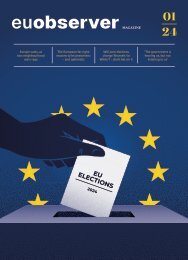Europe's Bioeconomy: The Business of Nature
EUobserver's 2018 Business in Europe magazine takes a closer look at Europe's bioeconomy and how "the business of nature" is changing the way people look at waste and natural resources.
EUobserver's 2018 Business in Europe magazine takes a closer look at Europe's bioeconomy and how "the business of nature" is changing the way people look at waste and natural resources.
You also want an ePaper? Increase the reach of your titles
YUMPU automatically turns print PDFs into web optimized ePapers that Google loves.
standard, EN13432, for products that meet certain<br />
criteria for compostability), and can therefore be<br />
collected alongside food waste, for example.<br />
without adequate waste collection and treatment,<br />
it could aggravate plastics leakage and create<br />
problems for mechanical recycling".<br />
But as von Pogrell explained at an event in<br />
Brussels organised by the European Policy<br />
Centre in February: "Biobased plastics are not<br />
necessarily biodegradable and compostable<br />
plastics are not necessarily biobased."<br />
Some bioplastics can therefore be recycled with<br />
their plastic cousins (though they can lose some<br />
physical properties after several 'cycles'), but<br />
some can't and therefore end up contaminating<br />
collections.<br />
How do you decipher which is which? With great<br />
difficulty.<br />
EU RULES ON COMPOSTABLE<br />
PLASTICS<br />
Brussels decided to step in. Proposed amendments<br />
to the packaging and packaging waste directive as<br />
well as the new plastics strategy published by the<br />
European Commission in January recognised the<br />
role bioplastics could play in helping "decrease<br />
our dependency on fossil fuels." Plastics' share <strong>of</strong><br />
global oil consumption is expected to rise from six<br />
percent in 2014 to 20 percent by 2050, according<br />
to the Ellen MacArthur Foundation.<br />
However, the commission said, "in the absence<br />
<strong>of</strong> clear labelling or marking for consumers, and<br />
To avoid "false environmental claims" and<br />
reduce confusion, the commission will publish<br />
harmonised rules for labelling "compostable" or<br />
"biodegradable" plastics. A life cycle assessment<br />
will also be developed to ensure biobased<br />
plastics result in "genuine environmental benefits<br />
compared to the non-renewable alternatives".<br />
<strong>The</strong> commission can't afford to hang about,<br />
either. As well its own anti-plastic legislative<br />
push, there's a pull from consumers looking for<br />
alternatives – the likes <strong>of</strong> Coca-Cola, Danone<br />
and Puma are all showing heightened interest<br />
in bioplastics - and Europe is where the action<br />
will be. <strong>Europe's</strong> share <strong>of</strong> global bioplastics<br />
production is forecast to jump from 18 percent<br />
to 25 percent between now and 2022; packaging<br />
will also remain the strongest segment.<br />
This could create jobs, reduce carbon emissions,<br />
make use <strong>of</strong> waste and revive rural areas,<br />
according to the bioplastics industry.<br />
But we shouldn't get too carried away. "If anyone<br />
thinks bioplastics will save the planet they are<br />
delusional," says one industry leader. Indeed, the<br />
most pressing issue is to reduce excessive and<br />
unnecessary use <strong>of</strong> plastics.<br />
<br />
Photo: Arshad Pooloo<br />
06 — BUSINESS IN EUROPE MAGAZINE 2018

















